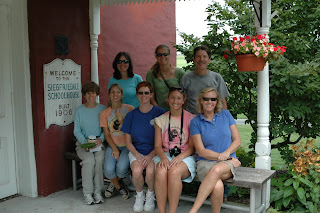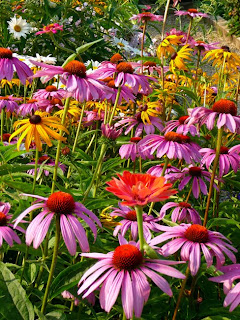 Late summer, for me, has always been about bumblebees, fireflies, and katydids. The heavy humid air just seems so full this time of year; full of buzzing, scratching, fluttering, squeaking. This year has seemed particularly loud though, not just at night when the katydids are singing to each other, but beginning early morning when I first arrive at Fairview Farm. A loud buzzing permeates the air and can be attributed to none other than the strange but beautiful Cicada! Large, flying, plant eating insects, Cicadas are related to Leafhoppers and live for years underground as juveniles, taking water and nutrients from tree roots. Annual Cicadas are around almost every year and spend only 2-8 years underground, but the larger broods of Periodical cicada populations live synchronized life cycles, emerging every 7-13 years. Entomologists have scheduled the next Periodical brood to emerge in 2013, but word is that the brood has emerged this summer, four years early!
Late summer, for me, has always been about bumblebees, fireflies, and katydids. The heavy humid air just seems so full this time of year; full of buzzing, scratching, fluttering, squeaking. This year has seemed particularly loud though, not just at night when the katydids are singing to each other, but beginning early morning when I first arrive at Fairview Farm. A loud buzzing permeates the air and can be attributed to none other than the strange but beautiful Cicada! Large, flying, plant eating insects, Cicadas are related to Leafhoppers and live for years underground as juveniles, taking water and nutrients from tree roots. Annual Cicadas are around almost every year and spend only 2-8 years underground, but the larger broods of Periodical cicada populations live synchronized life cycles, emerging every 7-13 years. Entomologists have scheduled the next Periodical brood to emerge in 2013, but word is that the brood has emerged this summer, four years early! Monday, August 31, 2009
Cicada Serenade
 Late summer, for me, has always been about bumblebees, fireflies, and katydids. The heavy humid air just seems so full this time of year; full of buzzing, scratching, fluttering, squeaking. This year has seemed particularly loud though, not just at night when the katydids are singing to each other, but beginning early morning when I first arrive at Fairview Farm. A loud buzzing permeates the air and can be attributed to none other than the strange but beautiful Cicada! Large, flying, plant eating insects, Cicadas are related to Leafhoppers and live for years underground as juveniles, taking water and nutrients from tree roots. Annual Cicadas are around almost every year and spend only 2-8 years underground, but the larger broods of Periodical cicada populations live synchronized life cycles, emerging every 7-13 years. Entomologists have scheduled the next Periodical brood to emerge in 2013, but word is that the brood has emerged this summer, four years early!
Late summer, for me, has always been about bumblebees, fireflies, and katydids. The heavy humid air just seems so full this time of year; full of buzzing, scratching, fluttering, squeaking. This year has seemed particularly loud though, not just at night when the katydids are singing to each other, but beginning early morning when I first arrive at Fairview Farm. A loud buzzing permeates the air and can be attributed to none other than the strange but beautiful Cicada! Large, flying, plant eating insects, Cicadas are related to Leafhoppers and live for years underground as juveniles, taking water and nutrients from tree roots. Annual Cicadas are around almost every year and spend only 2-8 years underground, but the larger broods of Periodical cicada populations live synchronized life cycles, emerging every 7-13 years. Entomologists have scheduled the next Periodical brood to emerge in 2013, but word is that the brood has emerged this summer, four years early! Wednesday, August 19, 2009
Preservation Funding is Again in the Hands of Voters

Funds from the 1998 Garden State Preservation Trust (GSPT) and the 2007 $200m bond measure have all been appropriated for state, county, local and non-profit open space, farmland and historic preservation projects throughout the state, leaving coffers virtually empty for any new projects.
Without additional funds, New Jersey will suffer the first gap in funding for preservation efforts in over two decades, missing out on tremendous land conservation opportunities and reduced land values in the current real-estate market. A $400 million bond measure would continue preservation efforts for two years at current levels. A recent analysis by the state found that a two-year, $400m investment could protect 73,500 acres of land and yield $10 in economic value for every $1 invested, in the form of ecosystem services (such as water purification, waste treatment and flood mitigation), natural goods (such as fish and farm products), and eco-tourism revenue across the state. Jobs would also be created through historic restoration and park development projects. Issuing the bonds would cost $10 annually per household and would increase state debt by less than 2%.
If you love your hometown and want to weigh in with your opinion on the importance of things like open spaces, historic preservation and clean drinking water, be sure to head to the polls on November 3rd.
Thursday, August 13, 2009
Field Trip!
 August is a fairly quiet month around the URWA headquarters. Many of our staff members and volunteers take some time off for annual summer vacations, while the ones who remain in the area use the time to catch up on research articles we've been meaning to read, prepare work plans for the coming fiscal year and make repairs to nets, gps units and other equipment that gets used heavily during the not-quite-so-hot and muggy months of the year.
August is a fairly quiet month around the URWA headquarters. Many of our staff members and volunteers take some time off for annual summer vacations, while the ones who remain in the area use the time to catch up on research articles we've been meaning to read, prepare work plans for the coming fiscal year and make repairs to nets, gps units and other equipment that gets used heavily during the not-quite-so-hot and muggy months of the year. 
August is also a month that affords us the unique opportunity to close the office for an entire day so our staff can venture out together on a field trip to a place we've all been wanting to explore. That's just what we did a couple of days ago! Nine of us piled into two vehicles (both hybrids) and drove to Kutztown, Pennsylvania to tour the 333 acre organic certified farm owned and operated by the Rodale Institute.
The farm is devoted to research, education and certified organic production and is highly regarded for its Farming Systems Trial, the longest-running U.S. experiment specifically designed to compare organic and conventional farming practices. During our tour, we got to see many research and demonstration plots, and we were really impressed by all of them!
The people of the Rodale Institute believe that changing the way we farm (and the way we eat) could be the most important step the world can take to address climate change and to help end the horrific cycle of hunger that afflicts so many of the world's economically poor people. Their research in the critical fields of soil health, water supply/water storage and regenerative farming practices (among others) is providing farmers, consumers and policy makers across the globe with tremendously important information that we can use to achieve our common goals of creating healthy human populations and healthy natural systems.
Tuesday, August 4, 2009
August 4, 2009

This is a busy week at the Fairview Farm Wildlife Preserve, URWA's headquarters at 2121 Larger Cross Road in Bedminster. In the next few days we'll conduct a campfire program for families, a nighttime astronomy program for grown ups and an open house for everyone in the community! We hope to have a good turn out for each of these activities -- they all promise to be lots of fun, and we hope you'll join us!
Friday, August 7th from 5:00 p.m. to 7:00 p.m.
$10 per family for members, $15 for non-members
Please register by calling URWA at (908) 234-1852, ext. 12 before Friday, August 7th
Gather around the campfire to roast hot dogs and marshmallows, listen to stories and enjoy the outdoors with other families at the beautiful Fairview Farm Wildlife Preserve.
Star Party
Friday, August 7th from 8:00 p.m. to 10:00 p.m.
$10 per person for members, $15 for non-members,
Please register by calling URWA at (908) 234-1852, ext. 12 before Friday, August 7th
Leave the kids at home with a sitter and treat yourself to a warm summer evening with friends at the Fairview Farm Wildlife Preserve. Members of the Morris Museum Astronomical Society will share their telescopes and talk with us about the stars, planets and meteors visible in the nighttime sky. Tea and desserts will be served, along with a bit of folklore about summer constellations. Bring a blanket or lawn chair, and a bottle of wine, if you'd like.
Open House
Sunday, August 9th from 10:00 a.m. to 1:00 p.m.
Free! No registration is required
The Upper Raritan Watershed Association’s Bird and Butterfly Garden at Fairview Farm Wildlife preserve is at its summer peak, so be sure to visit with your camera to take in the delightful sights, smells and sounds that await you there. URWA has just created a rain garden at the preserve, so you can see firsthand what is involved in planting one at your home and learn how to keep it watered with help from a home-made rain barrel.
